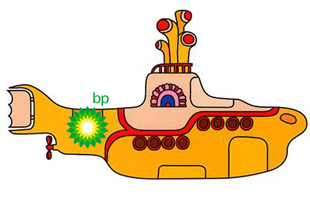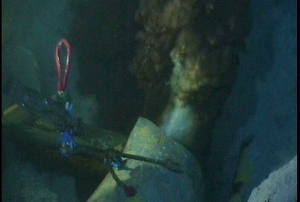With the Gulf storm Bonnie now dissipated, work has resumed on plugging BP’s gushing well once and for all. The company and federal government responders expect to start pumping drilling mud in from the top next week in an operation known as a “static kill,” and then begin injecting mud via the relief well in order to close off and cement the hole permanently. But even though the oil is no longer spewing into the Gulf, this “mud” they’re planning to pump into the well is actually a highly toxic chemical potion.
BP has been dodgy about the mud, much like they’ve been about everything else in the Gulf (see: dispersants, flow rate, underwater plumes).
BP dumped tens of thousands of gallons of the sludge into the well as part of the failed “top-kill” attempt in May, most of which ended up in the ocean. They are expected to use hundreds of thousands of gallons in these next attempts to kill the well. Asked about the toxicity of the mud at a hearing last month, BP CEO Tony Hayward told a congressional panel, “I believe all of the mud that had gone into the ocean is water-based mud with no toxicity whatsoever.”
Except, it’s not. According to written responses released to congressional investigators on Friday, the mud contains ethylene glycol, a highly toxic chemical commonly used in anti-freeze, and caustic soda, a compound more commonly known as lye that is is also toxic.
This, of course, also raises the question of how much of this stuff is pumped into the ocean on a regular basis. Drilling companies use about 100,000 gallons of this sludge for each operation. It’s a question that Reps. Ed Markey (D-Mass.) and Lois Capps (D-Calif.) raised in a statement over the weekend, following BP’s disclosure of the ingredients of the mud.
“Do all drilling activities involve the use of highly toxic formulations?” asked Markey. “If so, how many tens of thousands of barrels more may have been sent into our waters or onshore wells in even the most standard of operations?”
Oceans advocates have raised the question as well, noting that companies regularly dump hundreds of thousands of gallons of this stuff into the ocean, and we have no idea of its impact. Richard Charter, a policy advisor for Defenders of Wildlife, says “drilling discharges have always been a dirty secret.” Using these chemicals is also perfectly legal under current law. Most of the time, companies don’t even have to disclose the chemicals they’re using.
In a statement, Capps also points to this as another good reason to give the power of subpoena to the oil spill commission. A bill to do that stalled in the Senate. But as Capps notes, “Time and time again, BP has failed to disclose critical data and information that is essential to our ability to track the long term effects of this spill.”















